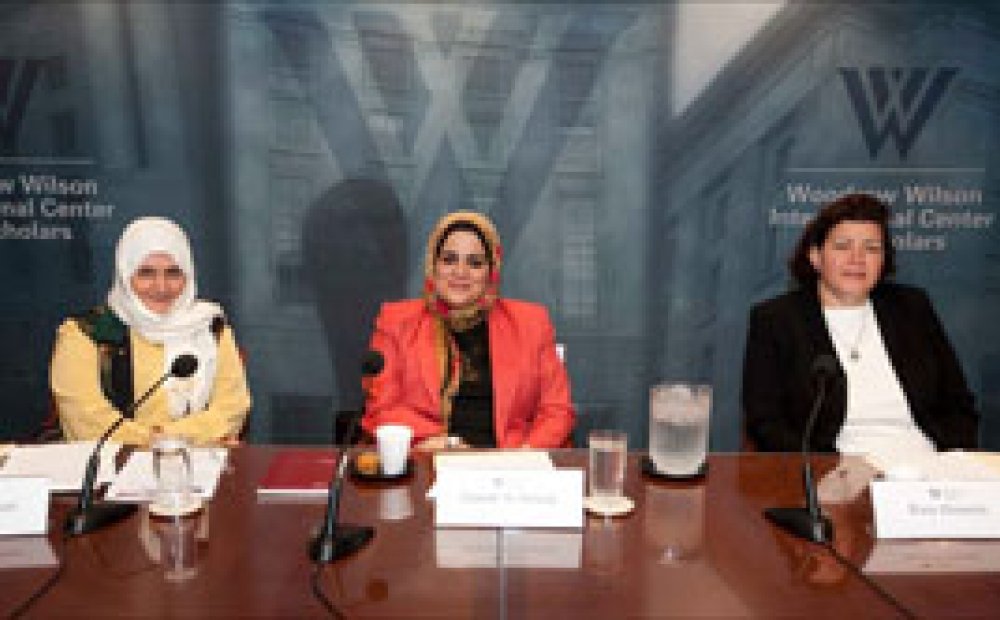A Modern Narrative for Muslim Women in the Middle East

For decades, women in the Middle East have actively struggled for equal status before the laws of their respective countries, equal participation in politics and society, and a general progressive justice for women throughout the region. While they have made progress through their struggles, many challenges remain. A report recently published by the American Islamic Congress titled A Modern Narrative for Muslim Women in the Middle East highlights the past and present triumphs and difficulties—economic, legal, political, religious, and social—that activists for women's rights face throughout the region, looking specifically at Egypt, Morocco, Iraq, Saudi Arabia, and Jordan.
On September 30, 2010, the Middle East Program of the Woodrow Wilson Center co-sponsored a panel discussion with the American Islamic Congress (AIC), reviewing women's status in Saudi Arabia and Jordan as outlined in AIC's report. Fawziah Al-Hani, Manager of Gherass Center for Social Education in Saudi Arabia, described the contemporary status of women in Saudi Arabia, projecting hope and frustration about the progress women have made in the country. Rana Husseini, human rights activist, author, and journalist, detailed the changes to women's status in Jordan over the past 20 years. Zainab Al-Suwaij, Executive Director of the American Islamic Congress, moderated the event.
Al-Hani opened her comments by explaining that in her native Saudi Arabia, she is perceived as a second-class citizen by the country's legal, economic, political, religious, and social institutions. Women's issues are rarely discussed in Saudi political and social spheres. Women have no place in official government and the business sector. And if they are allowed to be active outside the home, they are restricted to educational and health activities. Furthermore, equal and direct access to medical care and the court is very difficult for women; men can divorce their wives without notifying them; and travel is restricted for women without a guardian's approval. Only recently did women receive identification cards, though women must still be identified by a guardian and/or family members. These examples of restrictive Saudi policies towards women elicited frustration from Al-Hani as she noted that she cares less about her right to drive than she does about her basic right to be understood as an equal human being within her society. She indicated that she maintains hope, however, as small changes take place within the society and government through new initiatives and movements.
Husseini, who has spent nearly 20 years as a human rights activist in Jordan focusing on honor crimes and other women's issues, declared that Jordan has made substantial progress in the realm of women's rights as a result of intense media and civil society activism. Reform is still necessary in many spheres, but women are now participating in government and significant reforms have been made to the judicial system. Though the effectiveness of quotas for women in government may be debated, Husseini noted that quotas facilitate a beginning for women's participation in elections and government service (e.g. there are approximately 50 women judges in Jordan). She discussed how there is no longer an excuse for honor killings, except in extreme cases, and harsher sentences have been established for honor crimes. Challenges for the family remain in the case of citizenship law, which does not allow women who marry non-Jordanian men to pass their Jordanian citizenship to their husbands and children. With constant pressure on the government and society, reforms will continue and Husseini said she is optimistic about women's future in Jordan and in the Middle East.
The discussion and the report demonstrate that while women in the Middle East continue to face difficulties concerning their rights and equality, change can come with increased awareness and activism.
By Margaret Albert, Middle East Program
Haleh Esfandiari, Middle East Program
Hosted By

Middle East Program
The Wilson Center’s Middle East Program serves as a crucial resource for the policymaking community and beyond, providing analyses and research that helps inform US foreign policymaking, stimulates public debate, and expands knowledge about issues in the wider Middle East and North Africa (MENA) region. Read more
